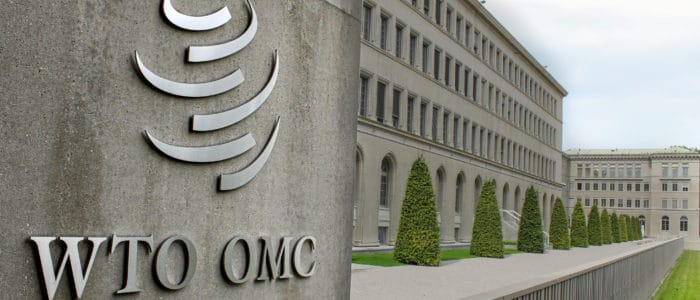Published
Webinar Summary: What Now for the WTO After MC13?
By: Matthias Bauer Guifré Margarit i Contel
Subjects: Agriculture Digital Economy Sectors WTO and Globalisation

The webinar “What now for the WTO after MC13”, hosted by ECIPE’s Director Matthias Bauer on March 12th, 2024, featured a wide and deep discussion on the post-MC13 landscape for the World Trade Organization (WTO) with insights from Dr Deborah Elms (Head of Trade Policy of the Hinrich Foundation in Singapore), Ignacio García Bercero (Director at the Directorate-General for Trade of the European Commission), and Alan Wm. Wolff (Distinguished visiting fellow at the Peterson Institute for International Economics and former deputy director-general of the WTO). The speakers provided a multifaceted analysis of the WTO’s current challenges and future directions, touching upon significant issues such as digital trade, plurilateral agreements, and the need for reform within the organization.
Dr Elms opened the conversation with a sobering outlook on the WTO’s capacity for handling contemporary trade challenges, particularly highlighting the difficulties in reaching a consensus on digital trade and the implementation of plurilateral agreements within the WTO framework. She pointed out the specific disappointment with the outcomes of the latest ministerial conference regarding e-commerce, where only a temporary extension of the moratorium on customs duties for electronic transmissions was achieved, reflecting broader issues of inertia within the WTO.
“I think one of the biggest challenges in the WTO in the digital space is the time lag between when the WTO decides the conditions are ripe and the stars are aligned and everybody is in great shape to be able to agree to something and where the business community is at and where customers are at and consumers in general. I think that the disconnect in digital has always been large but it continues every day that we miss an opportunity to make global rules, which is a problem because of the speed at which the digital economy is becoming the economy.”
Dr Deborah Elms voiced her concerns about the misalignment between the WTO’s activity and the needs of businesses regarding the digital economy.
Mr Wolff offered a perspective that, while acknowledging the WTO’s deficiencies, suggested potential pathways for progress. He noted the entry of small members into the WTO and highlighted the importance of universality to the organization’s mission. He also argued for a rethinking of the consensus mechanism, suggesting that a more flexible approach could allow for the advancement of plurilateral agreements and a revitalisation of the WTO’s negotiating function. He also emphasised the critical need for a functioning dispute settlement system and improved transparency mechanisms.
“We don’t have a binding dispute settlement that is effective for all. The United States blocked appointments to an Appellate Body. The EU and some others have an alternative mechanism, and we perpetuate a fraud which is appealing to a body that hasn’t existed for four years, going on five.”
Mr Wolff highlighted the need for the WTO to restore a binding dispute settlement system capable of enforcing obligations.
Mr García Bercero provided a more balanced assessment, acknowledging both progress and setbacks during MC13. He noted advancements in discussions on digital trade and the integration of plurilateral agreements into the WTO’s legal framework, despite political sensitivities that hindered more substantial achievements in areas such as fisheries subsidies and agricultural negotiations. He stressed the EU’s continued commitment to supporting the WTO and highlighted ongoing efforts to engage in digital trade negotiations bilaterally and plurilaterally, despite challenges posed by divergent national policies.
“I think it was really important that India and South Africa lifted their objections to the certification of the schedules of Services Domestic Regulation. That was the reason why it had not been possible to incorporate those schedules legally into the WTO, and as a result of very patient diplomacy, and I can assure you, in multilateralism, you need to be very patient, but it was mainly because of the efforts of the EU to have long discussions with India and South Africa. Both India and South Africa lifted their objections so that now, in principle, Services Domestic Regulation is part of the WTO rulebook.”
Mr García Bercero provided a more optimistic look during his intervention in areas such as the integration of plurilateral agreements in the WTO.
The discussion concluded with a speculative conversation about the potential impact of a Trump victory in the upcoming U.S. election on the WTO. While opinions varied, there was a consensus that such an outcome could lead to increased challenges for the organization, with potential shifts in U.S. engagement and policy that could further complicate the WTO’s ability to address global trade issues effectively.
Throughout the webinar, the speakers underscored the importance of patience, diplomacy, and innovation in navigating the complex landscape of global trade governance. The nuanced perspectives offered by Dr Elms, Mr Wolff, and Mr García Bercero illuminated the multifaceted challenges facing the WTO while also highlighting the potential for reform and progress in addressing the needs of a rapidly evolving global economy.
You can watch the full event below: